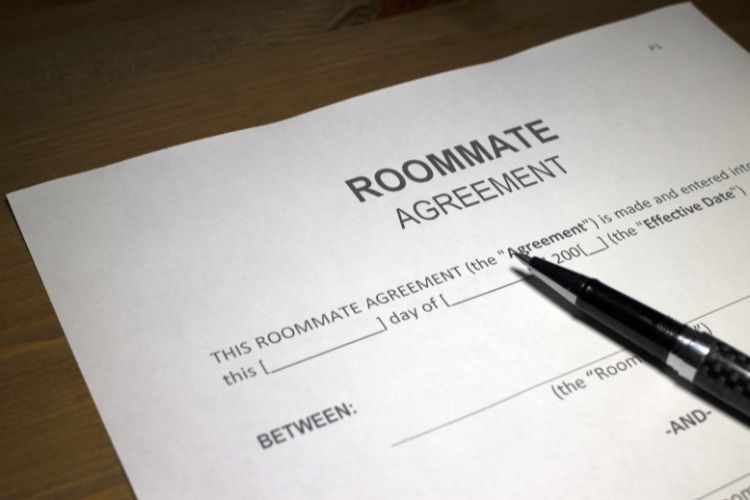
Living arrangements can take unexpected turns, and sometimes the need arises for one roommate to consider breaking the lease.
In this article, we’ll dive into the nuances of Australian tenancy law to give you practical insights and guidance on whether one roommate can break the lease.
We’ll discuss the legal framework governing shared accommodations and explore the circumstances under which a roommate may be eligible to exit the lease agreement.
Can One Roommate Break a Lease?

Yes, one roommate can break a lease in shared accommodations.
However, it’s important to understand that in Australia, where joint and several liability typically applies, the departing roommate remains financially responsible for their share of the rent until a replacement tenant is found or the lease term concludes.
This legal concept ensures that the remaining roommates are not unduly burdened by the departure of one tenant, emphasising shared responsibility for the lease obligations.
Understanding Joint and Several Liability
Shared accommodations often involve a legal concept known as joint and several liability.
In the context of leasing in Australia, joint tenancy means that all roommates collectively share the responsibility for the entire lease.
This essentially means that each tenant is equally responsible for fulfilling the terms of the lease, including paying rent to the real estate management company and adhering to the roommate agreements.
What Happens When a Roommate Leaves Without Fulfilling Financial Obligations?
If a roommate leaves without paying their share of the rent in a shared accommodation scenario with joint and several liability, the situation can pose challenges for the remaining tenants.
Here’s what typically happens:
Remaining Tenants Are Still Liable

Joint and several liability means that the remaining tenants are collectively responsible for the entire rent amount. If one roommate leaves without paying their share, the landlord can legally seek the full rent from the remaining tenants.
The landlord may choose to pursue the unpaid rent from any or all of the remaining tenants. They aren’t obligated to chase the departing roommate for their portion, as the principle of joint and several liability allows the landlord flexibility in seeking payment.
Potential Legal Consequences
If the remaining tenants fail to cover the unpaid rent, there may be legal consequences, including potential eviction.
Landlords may take legal action to recover the outstanding rent, and this could impact the rental history and credit scores of all tenants on the lease.
Can I Sue a Roommate for Breaking a Lease?
If you find yourself in a situation where a roommate has broken a lease, the possibility of suing them largely hinges on the terms of your rental agreement, the concept of joint and several liability, and the applicable local laws.
First and foremost, check your lease for any specific clauses addressing lease breaches and the responsibilities of tenants.
If your lease includes joint and several liability, both you and your roommate are collectively responsible for the entire lease. This gives you legal grounds to pursue a civil lawsuit if your roommate has broken the lease.
In Australia, pursuing legal action against a roommate typically involves the local Magistrate’s Court or equivalent jurisdiction in your state.
For claims within the small monetary limits, initiating legal action through the Magistrate’s Court is often accessible and cost-effective, especially when the amount falls within the small claims range of less than AU$6,000.
If the owed amount exceeds the small claims limit, seek legal advice from an experienced landlord-tenant attorney. They can help you navigate the legal channels specific to your state or territory.
Can a Roommate Break a Lease Without My Consent?
If your roommate signed the lease individually, they likely have the autonomy to break the lease without your involvement.
However, if both of you signed the lease jointly, it implies joint and several liability. Landlords often require both signatures for any alterations, including lease breaks. This means that your roommate can’t break a lease without your consent.
What to Do When a Roommate Wants to Move Out
When a co-tenant expresses the desire to move out, it’s essential to handle the situation with clarity, communication, and awareness of the legal and practical implications.

Here’s a guide on what to do:
Review the Lease Agreement
Start by reviewing the rental agreement to understand the terms related to lease termination, notice periods, and joint and several liability. Identify any clauses that outline the procedure for finding a replacement tenant.
Open Communication
Initiate an open and honest conversation with your co-tenant. Understand their reasons for moving out and discuss potential solutions. If they are open to it, collaborate on finding a replacement tenant to ensure a smooth transition.
Check Local Laws
Familiarise yourself with local tenancy laws governing tenant rights and obligations. Knowing the legal framework can guide discussions on notice periods, financial responsibilities, and the process of finding a replacement tenant.
Notify the Landlord
Inform your landlord promptly about your roommate’s decision. Discuss the possibility of searching for another tenant and seek guidance on the steps to take. Understanding the procedure for taking a name off the lease is crucial for a smooth transition.
Financial Responsibilities
Discuss the financial implications with your co-tenant. If the lease is under joint and several liability, emphasise the importance of finding a replacement tenant to share the financial responsibilities during the transition.
Document Agreements in Writing
If you and your co-tenant make any rental agreements, especially concerning the search for a replacement tenant or financial arrangements, document them in writing. Having clear documentation can prevent misunderstandings in the future.
Notify Utility Companies
Update utility companies about the change in tenancy to ensure a smooth transition of services. Confirm with your co-tenant the responsibilities for any outstanding bills and how they will be managed during and after the transition.
Conclusion
If the lease is signed individually by a roommate, they generally have the autonomy to initiate the process of breaking the lease without the involvement of the other tenants.
But if the lease is signed jointly, joint and several liability often apply, meaning the departing roommate remains financially responsible for their share, and the landlord may require both signatures for any changes to the lease.








